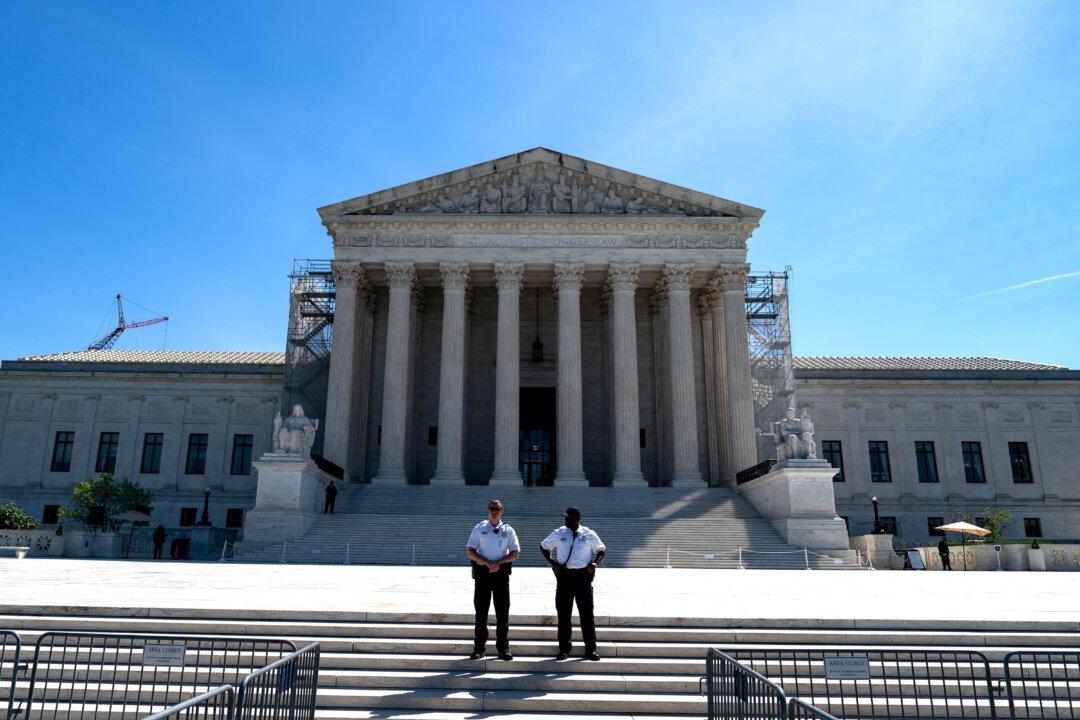
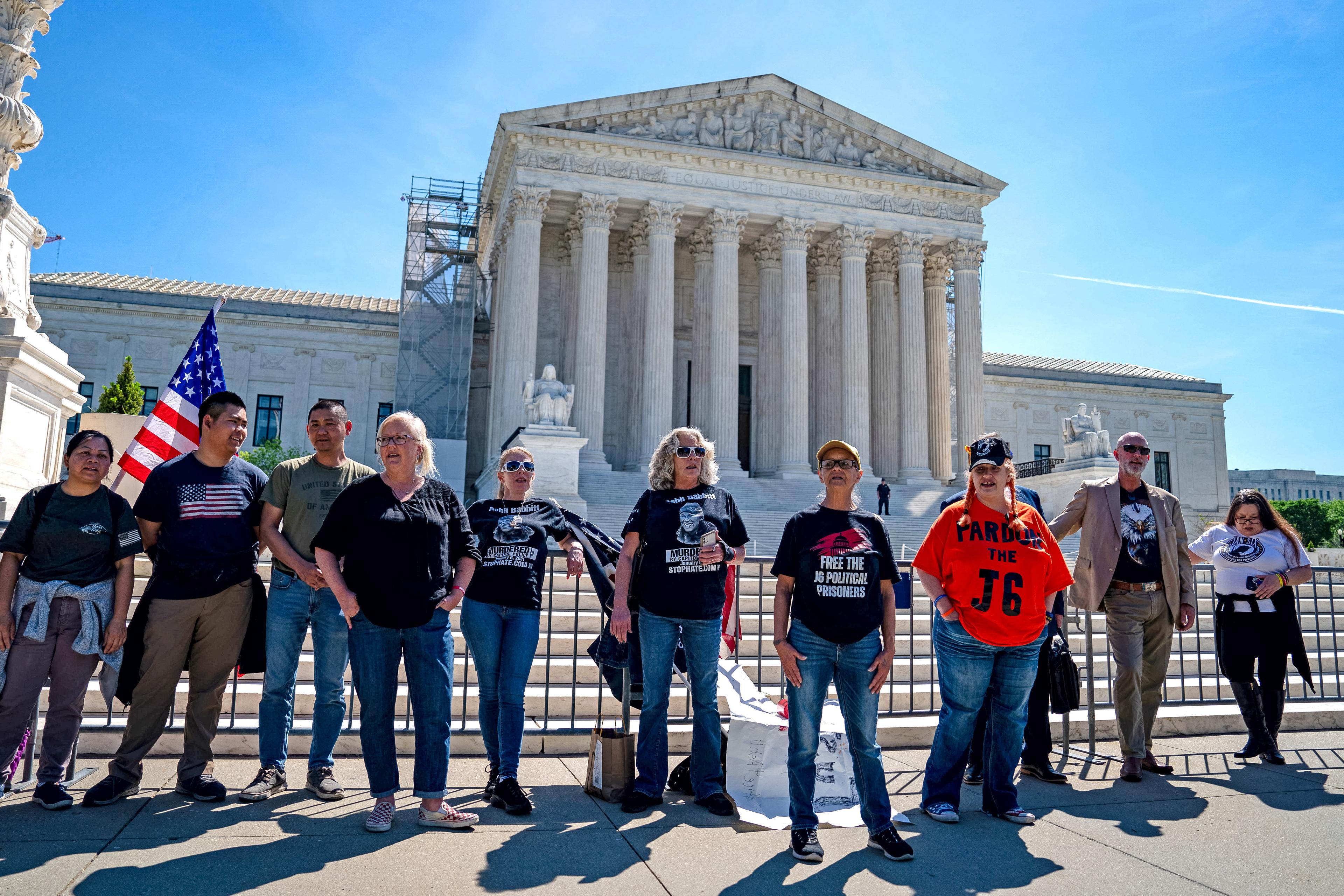
Conservative Supreme Court justices seemed generally sympathetic on April 16 to a former police officer charged under an accounting reform law after he entered the U.S. Capitol for four minutes on Jan. 6, 2021.
The case is being closely watched because once the Supreme Court rules, its decision could affect hundreds of Jan. 6 prosecutions, including the Jan. 6-related case against former President Donald Trump.
Joseph Fischer, from Jonestown, Pennsylvania, was indicted on several counts following the Capitol breach on Jan. 6, 2021, including obstructing an official proceeding under Enron-era obstruction law 18 U.S. Code Section 1512(c). Convictions under the section can lead to 20 years in prison.

The Supreme Court justices, particularly the conservatives, on April 16 appeared skeptical of the government's use of an Enron-era obstruction charge against Jan. 6 defendants, including former President Donald Trump in the federal election case.
Petitioner Joseph Fischer was charged under Section 1512(c) of the Sarbanes-Oxley Act, which was enacted after Enron executives destroyed evidence ahead of an official investigation.
The conservative justices were skeptical about applying the Sarbanes-Oxley Act to Jan. 6 and the government's use of the obstruction provision that carries a 20-year maximum sentence.

Jan. 6 defendant attorney Jeffrey Green rebutted Solicitor General Elizabeth Prelogar’s interpretation of Section 1512(c).
He said Ms. Prelogar implied that (c)(2) would cover peaceful protests as long as the “government could demonstrate that there was the adequate mens rea,” which is the mental state of a defendant and the person’s intent behind the protest.
Mr. Green argued that if the protesters had instead stormed the Capitol on Jan. 5, 2021, Ms. Prelogar’s interpretation of the law would imply the protesters would still violate (c)(2), “with respect to the ‘corruptly’ mens rea,” or intent.

Following Solicitor General Elizabeth Prelogar's admission that the statute being used to prosecute Joseph Fischer for his participation in the Jan. 6 protests was created to "close the Enron loophole," Justice Ketanji Brown Jackson admitted she was "struggling" with the "leap" in the solicitor general's argument.
"I'm struggling with leaping from what's happening in one in the context in which [the statute] was actually enacted to all of obstruction in any form," Justice Jackson said.
Ms. Prelogar responded, saying: "I think the reason why we wouldn't suggest that the context could bear that narrower reading is because of the actual language that Congress used."

Justice Barrett proposed a “what if” scenario to Solicitor General Elizabeth Prelogar: If the Capitol had not been breached and the protestors were kept outside, but their goal was to impede, chanting things like ‘stop the steal,’ getting too close, and ignoring police’s calls to disperse, would that still violate the statute in her view?
The solicitor general said if the same thing happened where Congress had to go into recess from a joint session due to the security risk, then it “probably would be chargeable if we had the intent evidence.”
On top of that, she pointed to examples such as if it was “absolutely clear that they were the ringleaders who had intended to obstruct and undertook the action with that specific intent and did so knowing it was wrongful” and knowingly found themselves in unauthorized areas outside of the Capitol.

Solicitor General Elizabeth Prelogar argued that Joseph Fischer, the petitioner in the case, went to the Capitol on January 6, 2021, with the intent to obstruct the proceeding with forethought and premeditation.
“He had said in advance of January 6 that he was prepared to storm the capital prepared to use violence. He wanted to intimidate Congress. He said, ‘They can't vote if they can't breathe.’
“And then he went to the Capitol on January 6, with that intent in mind, and took action including assaulting a law enforcement officer that did impede the ability of the officers to regain control of the Capitol and let Congress finish its work in that session.

Justice Amy Coney Barrett questioned Solicitor General Elizabeth Prelogar about whether she had put a "violence requirement" on the application of the statute being used to prosecute Joseph Fischer.
"Are you putting a violence requirement as an overlay on 'obstruct influence impede'?" Justice Barrett said, quoting the statute in question, and citing the solicitor general's previous answers to questions. "It seemed like you kept emphasizing the aspect of violence that was present on Jan. 6."
Ms. Prelogar responded, saying, "No, we don't think that's a requirement under the statute … When we can point to action here like assaulting a police officer, that is obviously wrongful, unlawful conduct, and everyone knows that that's a crime and you cannot do that.

Solicitor General Elizabeth Prelogar was asked again by Justice Thomas and Justice Roberts about previous prosecutions under c(2) and said: “We have charged C(2) in situations that don't involve evidence impairment.”
“The litigating position of the department has long been that, as its plain language suggests, it covers myriad ways of obstructing,” she said.
“I'm not aware of any other factual circumstance or event out in the world where we could have proved all of the elements of section 1512(c) to beyond the cases where we brought those prosecutions.”

Justice Neil Gorsuch questioned Solicitor General Elizabeth Prelogar about whether peaceful protests could lead to 20 years in prison due to her assertion that the law in question acted as a "catch-all" to prosecute those who obstruct an official proceeding.
"Would a sit-in that disrupts a trial or access to a federal courthouse qualify? Would a heckler in today's audience qualify or at the State of the Union address?” Justice Gorsuch questioned. "Would pulling a fire alarm before a vote qualify, and for 20 years in federal prison?"
Ms. Prelogar responded, saying that there were "multiple elements of the statute" that would not be satisfied in the hypothetical Justice Gorsuch proposed. She went on to assert that there are "built-in limitations" to the statute, saying "many of those things wouldn't be something the government could charge or prove."
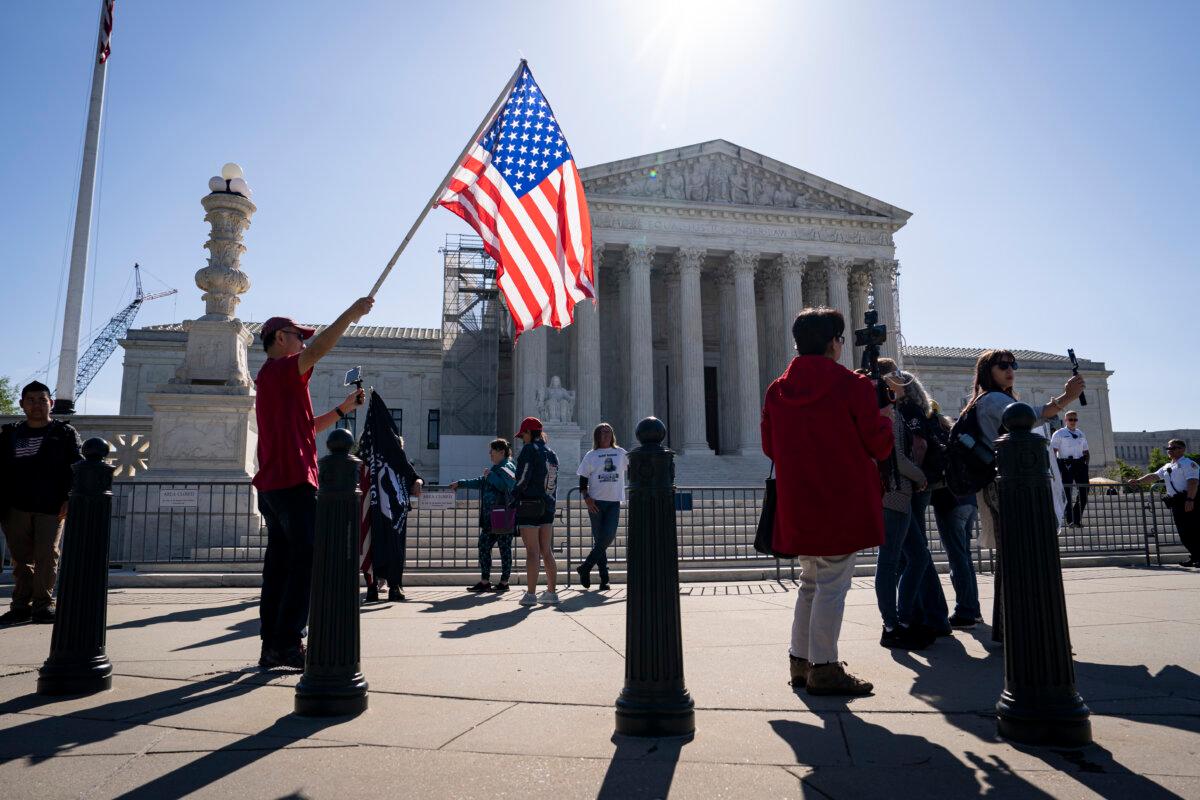

Supreme Court Justice Samuel Alito asked Solicitor General Elizabeth Prelogar if protestors obstructing a trial would violate the statute.
“For all the protests that have occurred in this court, the Justice Department has not charged any serious offenses, and I don't think any one of those protesters has been sentenced to even one day in prison. But why isn't that a violation of 1512 (c)(2)?” Justice Alito asked.
Ms. Prelogar replied that “there would be the backstop of needing to prove corrupt intent.”

Chief Justice John Roberts asked about whether (c)(2) controls and defines “the term that follows so that it should involve something that’s capable of alteration, destruction, and mutilation in with respect to a record or a document.”
He said the broadness of (c)(2) means you can’t just “tack on” terms from (c)(1) as if it’s “standing alone because it’s not.”
Solicitor General Elizabeth Prelogar responded, saying: “The more fundamental point I think is that I don't even understand petitioner to be suggesting that you can mix and match the verbs and the nouns from (c)(1) and (c)(2) in this way.”

Solicitor General Elizabeth Prelogar was asked to show examples where the government has enforced the obstruction provision in cases where there was no spoiling of evidence, just an obstruction of proceeding.
“I can't give you an example of enforcing it in a situation where people have violently stormed a building in order to prevent an official proceeding a specified one from occurring with all of the elements like intent to obstruct knowledge of the proceeding on having the corruptly mens rea up, but that's just because I'm not aware of that circumstance ever happening prior to January 6,” she said.
But she attempted to demonstrate where prosecution was brought up under the same provisions.

Solicitor General Elizabeth Prelogar asserted in her opening statements that the statute being used to prosecute Joseph Fischer uses the word “otherwise” to mean “in a different manner,” allowing it to be applied to the case before the court. If accepted, this application would be in addition to the statute’s original use regarding the destruction of physical evidence.
Ms. Prelogar said that 18 U.S. Code Section 1512(c), which is being applied to Joseph Fischer's case, "by its terms is not limited to evidence impairment. Instead, it's a classic catch all …[clause two] covers specified acts that obstruct an official proceeding, and covers all other acts that obstruct an official proceeding in a different manner."

Supreme Court Justice Ketanji Brown Jackson posed a scenario in which someone could steal an envelope and disrupt the official proceedings surrounding the election's certification.
“For example, let's say … it's in an envelope going to the vice president's desk, and someone does something to impair or prevent that from happening,” would (c)(2) cover that act, she asked.
Jan. 6 defendant lawyer Jeffrey Green said it would not affect the “integrity of the document” or availability of it.

Speaking to the commonalities of the language of the two sections of the statute in question, Justice Samuel Alito asserted that both involve documents or objects that are impaired or their integrity and/or availability compromised.
Justice Alito went on to warn Jeffrey Green, the attorney for Joseph Fischer: “I think that you may be biting off more than you can chew by suggesting.”
The justice asserted that reading the clause the way Mr. Fischer’s attorney read it would prohibit interpretation in any other way.

Justice Elena Kagan pointed out to Mr. Green that the statute was going to be “superfluous” and then “meant to function as a backstop.”
“Superfluidity is very often a good argument when it comes to statutory interpretation, but it's not a good argument when Congress is specifically devising a backstop provision to fill gaps that might exist,” she said. “They don't exactly know how they exist, but they think that they probably do exist in a pre-existing statutory scheme, and that's what this provision is intended to do.”
Mr. Green cited a previous case that said the dissenting opinion of the court was that the backstop was “supposed to be the omnibus provision.”

Supreme Court Justice Elena Kagan argued that Section 1512(c)(2) is not confined to evidence spoiling.
“The commonality is that the things that fall into (c)(2) also have to obstruct influence or impede, but what (c)(2) does not say really is (c)(2) also has to spoil evidence,” she said.
She argued that the criminal statute covers similar conduct, such as obstruction of a proceeding.

Supreme Court Justice Ketanji Brown Jackson asked January 6 defendant attorney Jeffrey Green whether “evidence” is stated in Section 1512(c).
She said section (C)(1) says “record, document, or other object” but doesn’t explicitly imply “evidence” has to be tampered with to fall afoul of the law.
“I appreciate that, you know, evidence can be such a thing, but you can imagine a world in which those two are different. So where does evidence come in and your theory and why is it there?” Justice Jackson asked.

Justice Amy Coney Barrett asked if the government could call out the second clause, “or (2) otherwise obstructs, influences, or impedes any official proceeding or attempts to do so, shall be fined under this title or imprisoned not more than 20 years, or both,” and attempt to prove his client “actually did try to interfere” with the arrival of the certificates to the vice president’s desk for counting, rather than obstructing the count of the certificates themselves.
Mr. Green said no because “the statute prohibits operation on the grounds of specific evidence in shape or form.”
However, Justice Barrett said that her hypothetical is evidence-related because it focused on certificates reaching the vice president, in the same way that someone in a trial or criminal proceedings may try to prevent evidence from being introduced.

Justice Sonia Sotomayor questioned Jeffrey Green, the attorney for Joseph Fischer, about his argument about how the statute in question, 18 U.S. Code Section 1512(c), would be applied if not in the way it was used against his client.
Justice Sotomayor asserted that there was "a very different articulation" of the law in the second clause of the statute, saying, "All I have to do is have the intent to impair by that very language, I don't have to have an actual proceeding that I've impaired on to you need an actual proceeding to impair."
Mr. Green seemed not to follow the justice's idea, saying, "I guess I'm I guess I'm a little confused, Justice Sotomayor, because as I read this, I would think that the government would say that any attempt at one is also covered by the statute."

In opening statements, Jeffry Green, lawyer of Jan. 6 defendant Joseph Fischer, argued that section 1512(c) of the Sarbanes-Oxley Act was only ever intended to be applied to evidence tampering cases.
The law was enacted in the wake of the Enron scandal when company leaders destroyed reams of documents and evidence while anticipating a wide-scale investigation. Congress passed the law to prevent this kind of behavior again, Mr. Green said.
“The January 6 prosecutions demonstrate that there are a host of felony and misdemeanor crimes that cover the alleged conduct.

The U.S. Supreme Court will hear arguments today in a case that could affect the prosecution of many Jan. 6 defendants—including former President Donald Trump.
Ex-police officer Joseph Fischer has been charged with, among other things, obstruction of an official proceeding in connection with the Capitol breach.
That charge was initially dismissed by a district court judge, but the ruling was later reversed by a panel of the D.C. Circuit Court of Appeals. The Supreme Court will weigh whether the appeals court erred in that reversal.

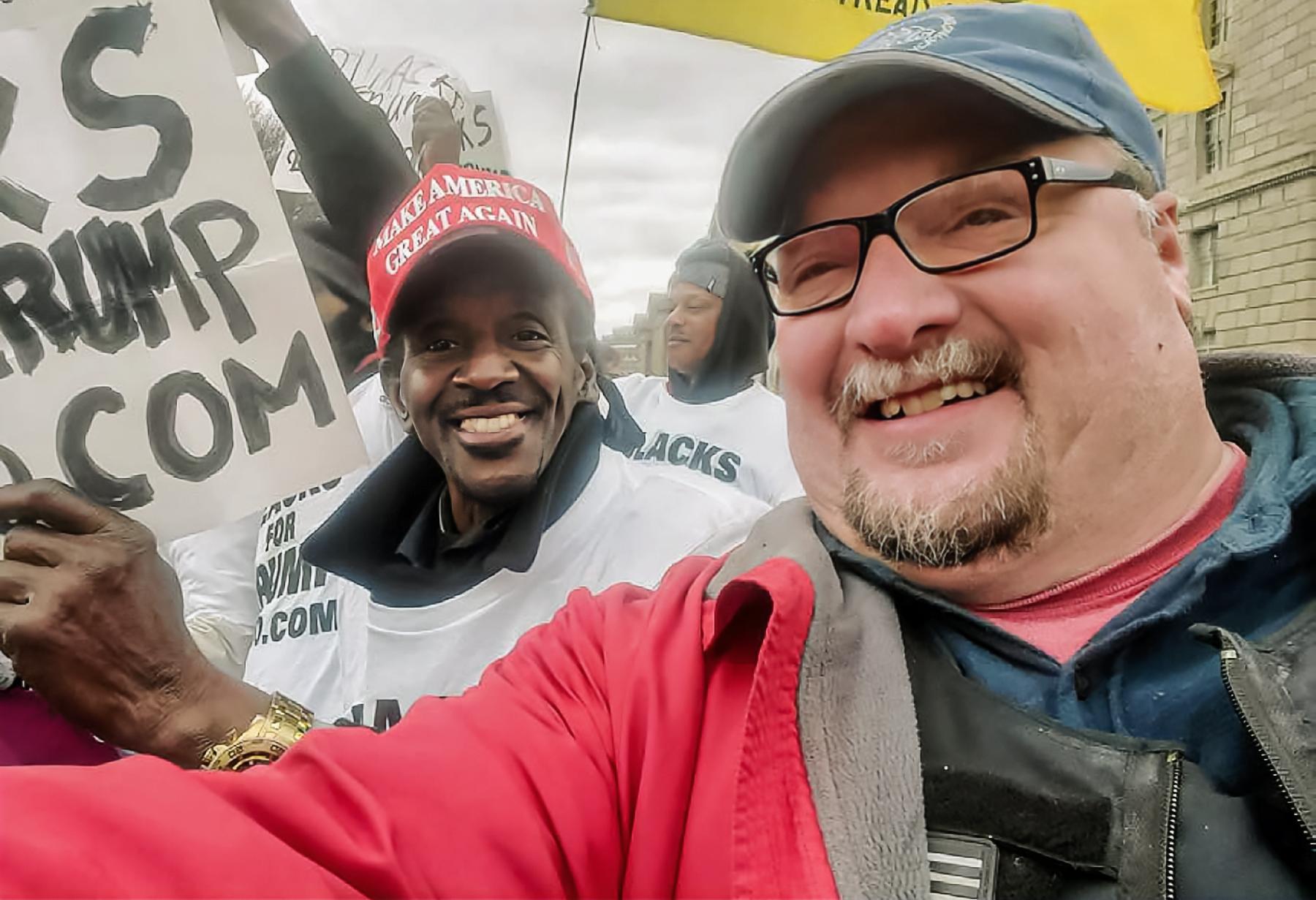
The Supreme Court is set to hear oral argument over the Justice Department’s (DOJ) use of an Enron-era obstruction law to charge individuals at the U.S. Capitol breach on Jan. 6, 2021.
Their decision in the case—Fischer v. United States—is thought to bear on the DOJ’s prosecution of former President Donald Trump in the federal election case, as well as hundreds of other Jan. 6 prosecutions.
On April 16, the justices will review whether a section of the Sarbanes Oxley Act of 2002 applies to several Jan. 6 defendants, including Joseph Fischer, a former Pennsylvania police officer who entered the Capitol on that day.

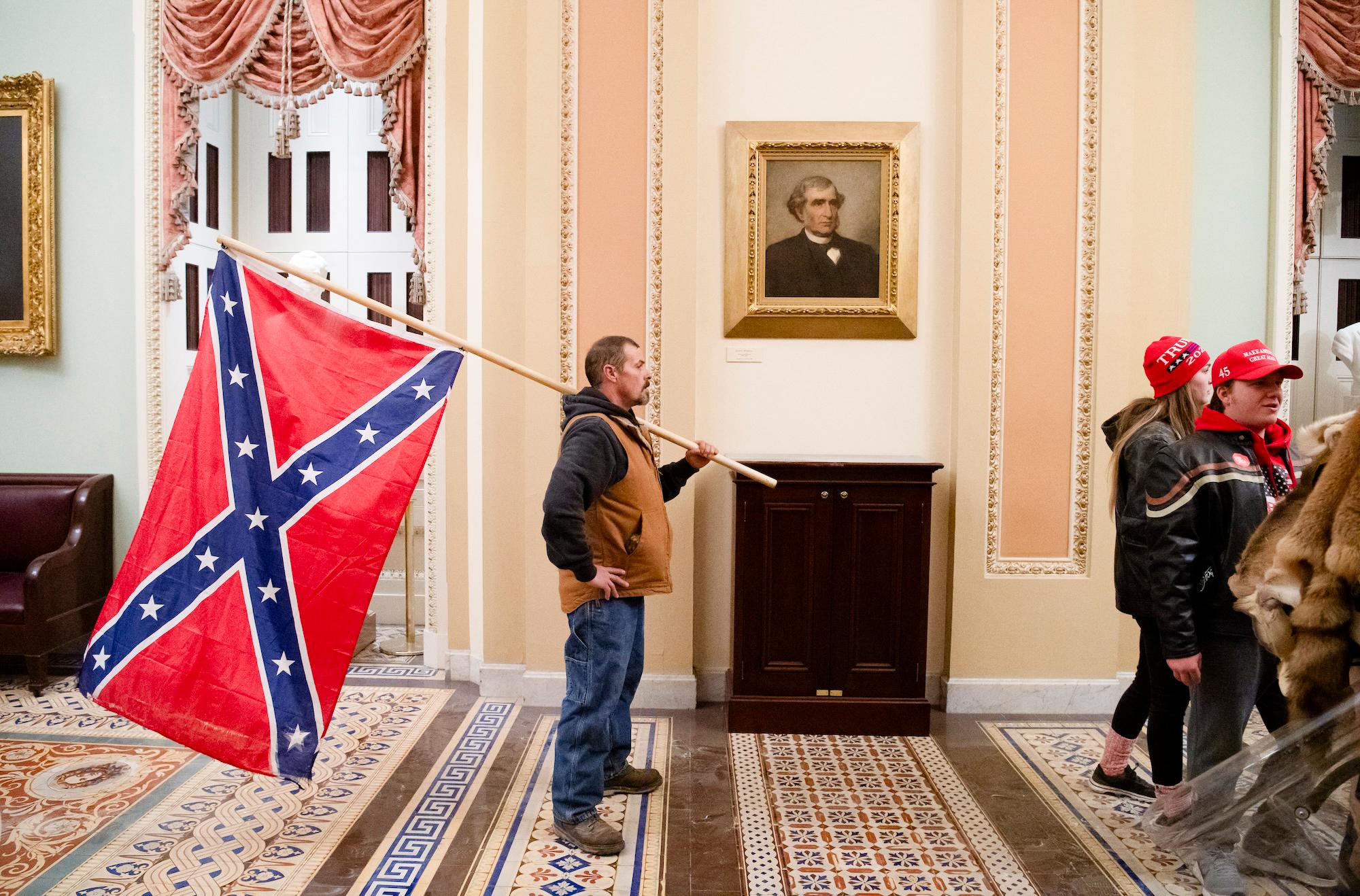
A Delaware man serving a three-year sentence for marching through the halls of Congress on Jan. 6, 2021, is poised to be released from prison pending appeal after serving one year thanks to a Supreme Court decision to review the Biden administration’s novel use of an evidence-tampering law to prosecute hundreds of Jan. 6 defendants for felony obstruction of Congress.
